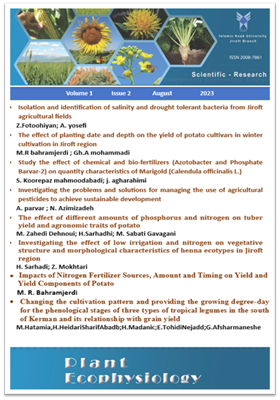Examining the problems and solutions for managing the use of agricultural pesticides to achieve sustainable development
محورهای موضوعی : Journal of Plant ecophysiologyنجمه عظیمی زاده 1 , عباس پرور 2
1 - گروه گیاهپزشکی، واحد رفسنجان، دانشگاه آزاد اسلامی، رفسنجان، ایران.
2 - گروه اقتصادکشاورزی، واحد جیرفت، دانشگاه آزاد اسلامی، جیرفت ، ایران.
کلید واژه: Sustainable Development, Environmental pollution, IPM, Pesticide management, Pest resistance,
چکیده مقاله :
In recent years, due to the increase in world population and the need to produce more food, a significant growth in the consumption of chemical pesticides has been seen in developed and especially developing countries. Although chemical pesticides are essential components of modern agriculture, they are also considered as one of the important sources of environmental pollution. Resistance of pest and disease species and weeds to chemical poisons, poisoning, destruction and severe erosion of soil, water pollution, adverse effect on non-target organisms, threat to human health and destruction of the environment are among the most important effects of these substances. are chemical. In this regard, integrated pest management (IPM) is introduced as one of the protective technologies in sustainable agriculture, which means the correct, logical and principled use of pesticides as a powerful tool along with other methods. Therefore, minimizing the use of chemical poisons, reducing the dose of poisons and using them on time, using selective, non-chemical and environmentally friendly pesticides, and finally introducing and using integrated pest management methods should be on the agenda. This is a way to achieve sustainable development in agriculture.
در سال های اخیر با توجه به افزایش جمعیت جهان و نیاز به تولید غذای بیشتر، رشد چشمگیری در مصرف آفتکش های شیمیایی در کشورهای توسعه یافته و به ویژه درحال توسعه دیده شده است. گرچه سموم شیمیایی از اجزاء ضروری کشاورزی مدرن است، اما یکی از منابع مهم آلودگی زیست محیطی نیز محسوب می شوند. مقاوم شدن گونه های آفات و بیماری ها و علف های هرز به سموم شیمیایی، مسمومیت ها، تخریب و فرسایش شدید خاک، آلودگی های آب ها، تاثیر سوء بر موجودات غیر هدف، تهدید سلامت انسان و تخریب محیط زیست از مهم ترین آثار این مواد شیمیایی هستند. در این راستا، مدیریت تلفیقی آفات (IPM) به عنوان یکی از فناوری های حفاظت کننده در کشاورزی پایدار معرفی می شود، این به معنی استفاده صحیح، منطقی و اصولی از آفتکش ها به عنوان ابزاری قدرتمند در کنار سایر روش هاست. بنابراین، باید به حداقل رساندن مصرف سموم شیمیایی، کاهش دوز مصرف سموم و مصرف به موقع آن ها، استفاده از آفت کش های انتخابی، غیرشیمیایی و سازگار با محیط زیست و در نهایت معرفی و بکارگیری شیوه های مدیریت تلفیقی آفات در دستور کار قرار گیرد که این روشی جهت دستیابی به توسعه پایدار در کشاورزی است.


